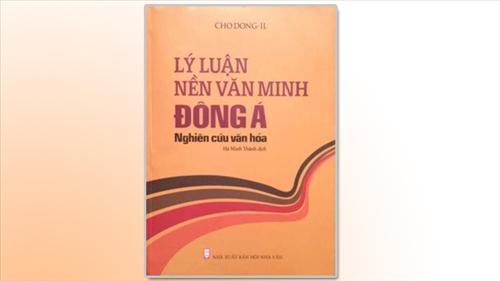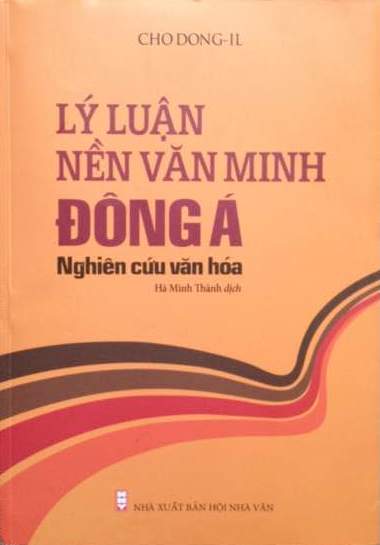
In recent times, there have been quite a few Korean publications translated into Vietnamese and published, but most of them are limited to literary works. Research documents, especially in-depth research, are very scarce, if not almost non-existent.
Theory of East Asian civilizationPublished in 2010, it is like a work that fully demonstrates the profound comprehensive knowledge of author Cho Dong-il (Korea) about East Asia on a wide range including literature, religion, fine arts, history, culture, diplomacy...
Theory of East Asian civilizationincluding 5 chapters, linking history and civilization along the historical lines from ancient, medieval, modern times and then bringing those contents into the discussions that are of interest. As an East Asian scholar, after many years of diligent research, Cho Dong-il also put forward the things that he and the next generation need to do to recognize, inherit and develop East Asian civilization.

Cover of the book Theory of East Asian Civilization by author Cho Dong-il (translated by Dr. Ha Minh Thanh)
“East Asia” is a topic that not only the East Asian region but the whole world is focusing on. In such a context,Theory of East Asian civilizationcan be considered an extremely valuable document. Previously, people still thought that East Asia only mentioned China, Korea and Japan, but Cho Dong-il defined the East Asia region in this document as including Vietnam. This is clearly affirmed and specifically shown in the contents of the comparison between countries in East Asia. Although, as the author himself admitted, documents about Vietnam are limited, he has made efforts to research deeply to have accurate and objective comments about Vietnam, trying not to be too biased in quantity when comparing with other East Asian countries. Even the title of the book is written in all 4 languages. Therefore, this document is very impressive and even more valuable to the Vietnamese people.
Theory of East Asian civilizationhas been translated into Japanese. This time, the book was translated into Vietnamese by Dr. Ha Minh Thanh (Faculty of Oriental Studies, University of Social Sciences and Humanities) and published in Vietnam with the sponsorship of the Korean Literature Translation Institute. The book is expected to become a necessary document, not only for Korean scholars but also for scholars from other countries. It is applied for research rather than for the general public.Theory of East Asian civilizationwill be useful document for those interested.
|
Professor Cho Dong-il Cho Dong-il was born in 1939 in Korea. After graduating from Seoul National University with a major in French literature and Korean literature, he continued his studies and received a doctorate in literature. Cho Dong-il used to write poetry and novels, but he is better known as a researcher. He used to be a professor at Gyemyeong University, Youngnam University, and the Central Institute of Korean Studies. Since 1994, he has been a professor at the Department of Korean Language and Literature at Seoul National University. His typical early research works on oral literature include:Research on narrative folk songs(1970),The aesthetics of Korean masked theatre(1975),Meaning and chthe function of character legends(1979),History and principles of masked dance(1979),Thsingleof vaoral learning(1980)… Besides, he made efforts to systematically build research on national literature according to each genre through works such as:Theory of Korean novels(1978),Historical commentary on Korean literary thought(1978),Literary research methods(1980). His research on poetry is quite numerous such as:Traditions and meter of Korean poetry(1982),Korean Folk Song Tradition and Poetic Metres(1996),Historical consciousness of Korean poetry(1993). Also not to be missed are:History of Korean LiteratureThe complete set of 6 books written from 1982-1988, mentioned the overall flow of the history of national language literature in each era, paying attention to specific situations where conflicts or discontinuities occurred.National language literature and common language literature(1999) took the interpretation of medieval literature as a fundamental problem that linked the history of civilization and the history of literature,Homogeneity and heterogeneity of civilization(1999) advocated that Korean literary research must expand its academic scope from “import” to “independence” to move towards creativity. InAre the history of philosophy and the history of literature one and the same?(2000), he pointed out that the relationship between philosophy and literature is both one and two. Cho Dong-il devoted much effort to developing innovative research methodologies, which can be said to have shown sustained activities to establish new theories of understandings of literary history such as systematizing narrative literature including oral literature, linking the unique research methods of national literature with literature of other countries and other fields. Through such research activities, Cho Dong-il went beyond studies limited to national literature or a particular genre, paying attention to a new literary history that transcends genre, space and time. |
|
Dr. Ha Minh Thanh Dr. Ha Minh Thanh was born in 1978, graduated with a BA in Korean Studies from the University of Social Sciences and Humanities, Hanoi (June 2000), a MA in the same major from Seoul National University (August 2005), and a PhD in Modern Korean Literature from Inha University (February 2014). Dr. Ha Minh Thanh is currently a lecturer at the Department of Korean Studies, Faculty of Oriental Studies, University of Social Sciences and Humanities, Hanoi, teaching and researching Korean language and literature. Dr. Ha Minh Thanh has translated the following books:Time to eat lobster(Published by the Writers' Association in 2005),Collection of modern Korean short stories(2006),Modern Korean Society(general translation, 2007),Collection of short stories by Hwang Sun-won(2009),Lee-sang Short Story Collection(2011). |
Author:ussh
Newer news
Older news